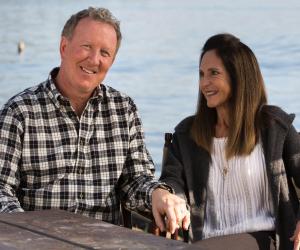You can also download this content and read it later
1. Awareness & Acceptance
I learned early that my own recovery was dependent on being aware of each element of my brain injury and accepting all of them, one step at a time. The same is true for all of the hurdles we face in life. Moving forward isn’t possible without awareness and acceptance. Our ability to transcend, recover and overcome is reliant on the first step - acceptance.
2. Support Network - Caregivers
During my recovery, my primary caregiver was my wife Laura and my network was my family, friends and coworkers. I wouldn’t have made it without support. Reaching out to our support networks in challenging times and leaning on loved ones is human. It’s wise to have support networks at home and in our communities. We have each other’s backs when we build trusting relationships.
3. Right Tools
My Neuro Rehab therapists and physicians gave me the “right tools” to recover from my traumatic brain injury. I still use them today. Utilizing the right tools in our careers and everyday lives is paramount in overcoming the challenges that bombard us out of nowhere. Education, degrees, certifications, “institutional knowledge”, valuable life lessons, core values and listening to our instincts is what ultimately lifts us over hurdles in life. Take pride in learning and in your individual skill sets, utilize the wisdom of others and the professionals available to guide us through life’s obstacles.
4. Drive & Motivation
Luckily when I woke up from my coma, I had the same work ethic and drive I’d always had. In Neuro Rehab I worked 2 and 3 times harder than I was asked to relearn how to Speak, Read, Write and Walk again, just to hear the words, “Greg you’re doing a good job.” Working harder than required is not easy, but essential when it comes to overcoming adversity. I admit, at my lowest points I leaned on my caregivers. You have to want it, because at the end of the day, it’s you’re inner drive that will boost you over life’s challenges.
5. Problem Solving
It was an awakening when I realized problem solving was one of the big keys in my TBI recovery. Problems kept coming at me and it was time to solve them. The key was not backing away and facing them head on. The more I was able to do this, without getting frustrated, the better I became. “Keep your cool Greg,” I would say to myself. When I controlled myself, I was faster at solving issues. The more skilled we become in problem solving mode, the more nimble we’ll be when obstacles hit us.
6. Service – Give Back
When I finished my initial round of Neuro Rehab, I immediately felt a tremendous burden of debt on my shoulders for all of the gifts I received after my accident and recovery. I asked for ways to volunteer and give back. I was driven with desire to help other brain injury survivors and their caregivers. As I volunteered, I received much more than I was able to give. It was life changing. As we step outside of ourselves to assist others we learn what life is. Service is the cornerstone of our human experience.
7. Gratitude & Love
When I woke up from my coma I was still surrounded in a sea of love and a state of bliss. Gratitude was its core. Of all the keys, this is the most vital. Without gratitude and love, life has no meaning. Love is the necessity of all human connections and carried me throughout my recovery. As we face challenges in life, it is love within us - surrounding us - that becomes more tangible. Hold it dear to you. Grasp it and don’t let go. Share it with others when they are in need. Independent of our differences, this is what all of us need, at every level of our journey. Gratitude is the key that will guide us when obstacles arise and we face hurdles in our lives that seem insurmountable. Gratitude and love, along with the other keys, become our rock as we overcome life's obstacles


